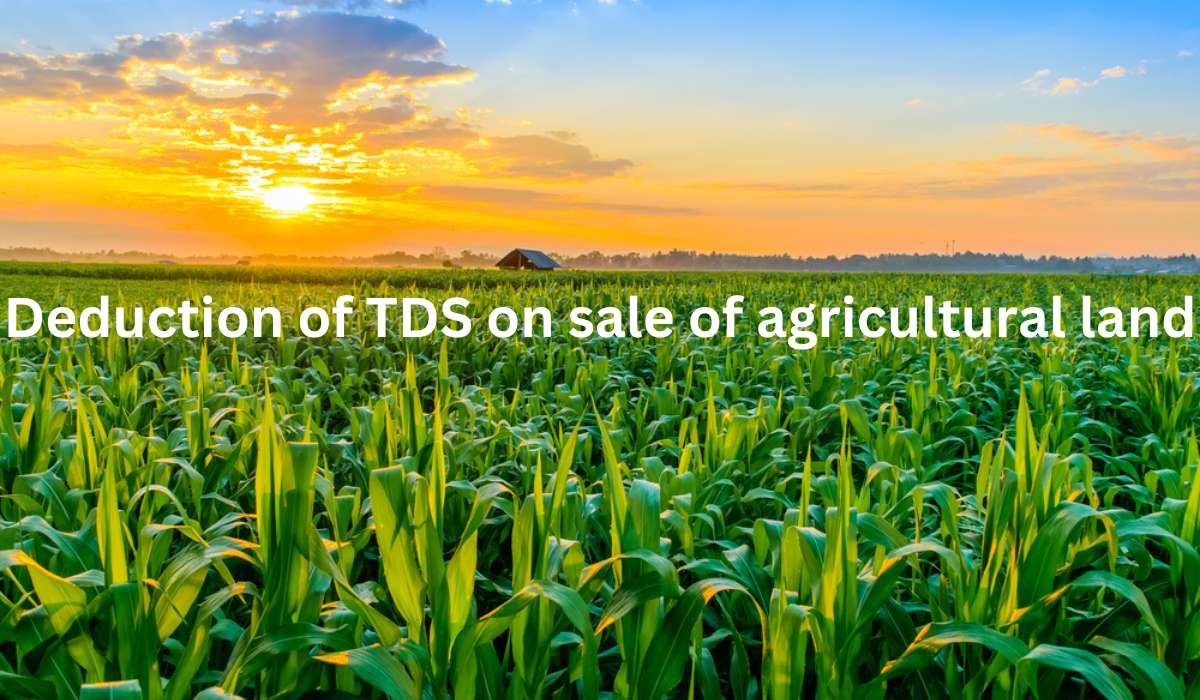The proceeds derived from the sale of agricultural land in India generally benefit from tax exemptions. Nevertheless, specific conditions govern these exemptions, taking into account factors such as the land’s location, current usage, ownership details, and the transactional amount associated with the property. For individuals involved in the process of selling agricultural land, it is crucial to gain an understanding of the Tax Deducted at Source (TDS) implications related to such transactions.
While the sale of agricultural land is undeniably a financially rewarding endeavour, it is equally imperative to comprehend the tax consequences associated with it. In simpler terms, a piece of land qualifies as a capital asset, implying that the profits generated from its sale are deemed capital gains and are typically subject to taxation. However, the tax obligations differ when the property in question is designated as agricultural land.
What is TDS?
TDS serves as a tax collection mechanism implemented by the Indian government to ensure that taxes are deducted at the source of income, providing a streamlined process for revenue collection.
The scope of TDS extends to various types of income, including salaries, interest, rent, and professional fees. Within the TDS framework, the entity making a payment is obligated to deduct a specific percentage of the payment as tax and subsequently deposit it with the government. The deducted amount is then attributed to the payee’s account, serving as tax paid on their behalf. The rates of TDS fluctuate based on the nature of income and the recipient’s status. For instance, the TDS rate applicable to salary income differs from that for interest income.
Adherence to TDS regulations is paramount for both individuals and businesses to sidestep penalties and legal repercussions. The TDS system not only guarantees a consistent influx of revenue for the government but also facilitates the efficient collection of taxes across various income streams. As such, a comprehensive understanding and compliance with TDS requirements become integral components of responsible financial management.
See also: How to file TDS on property in 2024?
What is TDS on sale of rural and urban agricultural land?
Agricultural land holds paramount importance in the Indian context, and comprehending its tax implications is pivotal for those who own such assets. The tax regulations governing rural and urban agricultural land diverge based on a myriad of factors, necessitating a nuanced understanding.
Rural agricultural land
In rural areas, the sale or transfer of agricultural land enjoys exemption from income tax. This favourable treatment extends to both individuals and Hindu Undivided Families (HUFs). However, a noteworthy caveat lies in the taxation of income derived from farming activities conducted on rural agricultural land. While the transfer itself may be exempt, any income generated through farming on such land is subject to taxation.
Urban agricultural land
Contrastingly, urban agricultural land assumes the classification of a capital asset. Despite this categorisation, all capital gains arising from the compulsory acquisition of urban agricultural land are granted tax exemption under section 10(37). Additional exemptions are also available under section 54B concerning the sale of urban agricultural land. It is crucial to highlight that section 54B specifically applies to Hindu Undivided Families (HUF) and individuals. However, businesses engaged in the buying and selling of agricultural land are obligated to pay taxes on any profits accrued during such transactions.
The taxability of urban agricultural land is contingent upon the capital gains realised from its sale. This involves the calculation of gains by deducting the indexed cost of acquisition from the selling price. The resulting amount is then subjected to taxation based on the applicable capital gains tax rate.
What is the present TDS on agricultural land?
In the current scenario, individuals involved in the sale or purchase of the immovable property are subject to a one per cent Tax Deducted at Source (TDS) deduction when the transaction value surpasses Rs 50,00,000. Notably, Section 194IA of the Income Tax Act governs these TDS rates. However, a crucial distinction arises when it comes to transactions involving agricultural land, where the stipulated TDS rates outlined in Section 194IA become inapplicable, even when the transaction value exceeds Rs 50,00,000.
This exemption from TDS on agricultural land transactions emphasises a recognition of the unique nature and significance of such transactions in the Indian economic landscape. While the TDS mechanism remains a crucial facet of tax collection, its application has been intentionally exempted for agricultural land transactions, acknowledging the distinct characteristics and societal importance attributed to agricultural activities. As a result, individuals engaged in the sale or purchase of agricultural land need not adhere to the TDS rates specified under Section 194IA, offering a nuanced regulatory framework that aligns with the specificities of transactions involving this vital asset class.
How to minimise taxability?
When contemplating the sale of agricultural land in India, it is imperative to carefully assess the associated tax implications. Employing strategic measures can not only minimise tax liability but also enhance overall profitability. Here are some effective strategies to consider
Holding period consideration
The duration for which you hold the agricultural land plays a pivotal role in determining the tax liability. If the holding period exceeds two years, the land qualifies as a long-term capital asset, resulting in more favourable tax rates. Longer holding periods attract lower tax rates, providing an incentive for landowners to plan their transactions to maximise tax benefits.
Agricultural income classification
If the agricultural land has been generating income from farming activities for the preceding two years, it can be classified as agricultural land. This classification opens avenues for claiming exemptions under Section 10(1) of the Income Tax Act. Leveraging this provision can significantly reduce the overall tax burden associated with the sale of such land.
Indexation benefit utilisation
The Indexation benefit serves as a powerful tool to adjust the purchase price of the land for inflation. By applying the Cost Inflation Index (CII), the taxable capital gains can be effectively reduced. This adjustment accounts for the erosion in the value of money over time, resulting in a lower taxable amount and consequently, a diminished tax liability.
Investment in capital gains bonds
Section 54EC of the Income Tax Act allows landowners to reinvest the capital gains generated from the sale of agricultural land into specified bonds within a stipulated timeframe, typically six months. This strategic investment not only facilitates capital preservation but also offers tax-saving benefits. By redirecting the gains into these designated bonds, individuals can defer their tax liability, contributing to effective tax planning.
FAQs
What is TDS on the sale of agricultural land?
TDS, or Tax Deducted at Source, is a mechanism by the Indian government to deduct taxes at the source of income.
How does TDS work in land transactions?
TDS is deducted at a rate of 1% on the sale or purchase of immovable property when the transaction value exceeds Rs 50,00,000.
Is TDS applicable to both rural and urban agricultural land?
TDS rules differ for rural and urban agricultural land. While rural land transactions are generally exempt from income tax, urban land transactions are subject to specific capital gains tax regulations.
What are the exemptions for agricultural land under TDS?
Agricultural land transactions are exempt from TDS under Section 194IA, even if the transaction value exceeds Rs 50,00,000. This exemption acknowledges the unique nature of agricultural land transactions.
How does the holding period impact tax liability on agricultural land?
Holding the agricultural land for more than two years qualifies it as a long-term capital asset, attracting lower tax rates.
Can agricultural income affect the taxability of land transactions?
Yes, if the land generates agricultural income for the past two years, it can be classified as agricultural land, allowing for exemptions under Section 10(1) of the Income Tax Act.
What is indexation benefit, and how does it help in reducing tax liability?
Indexation benefit adjusts the purchase price of the land for inflation using the Cost Inflation Index (CII). This adjustment reduces taxable capital gains, leading to a lower tax liability.
| Got any questions or point of view on our article? We would love to hear from you. Write to our Editor-in-Chief Jhumur Ghosh at jhumur.ghosh1@housing.com |







